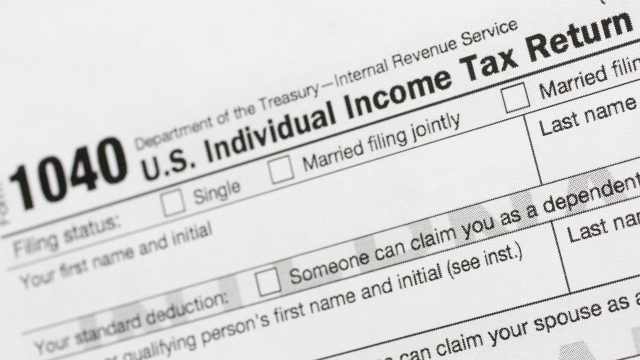The promise of a free and simple tax filing from companies like TurboTax, is probably all over your TV right now.
A paper written by four economists found up to 73 million Americans have taxes so simple, the IRS could calculate them automatically with the data they already have on file.
These "pre-populated" tax forms could prove extremely popular, considering nearly half of Americans are bothered by the complexity of the tax system.
Difficulties may begin when you have more than one stream of income: through portfolios (like stocks and bonds), passive income, or earned income.
According to Dorothy Brown, a law professor at Georgetown University Law Center, your filing status can also make returns tricky.
"So a different tax rate that applies if you're a head of household is a different tax rate that applies as it added. So in some of these, tax rates are beneficial to some taxpayers. Some tax rates are penalizing to other taxpayers. So, you know, it really depends," Brown said.
Our taxes are also complicated by expenditures, or government spending through the tax code. Those are benefits like deductions or credits.
Instead of directly administering homeownership or child care programs, the government offers tax breaks like the child care tax credit, or a deduction on your mortgage interest.
Brown says for better or worse, tax breaks exist to incentivize certain behaviors like buying real state, having children or driving electric cars.
"Congress picks and chooses among personal behavior. Some they encourage, some they penalize even when they say they're not penalizing," Brown said.
Taking away deductions may make filing easier, but it’s not a simple task, as countless groups and organizations rely on tax breaks.
One CPA gave us this example: charitable organizations get a lot of contributions because of tax deductibility and taking away credits could hurt their donations.
And if you misfile tax breaks, you could get a penalty.
In fact, Brown says, expenditures like the "earned income tax credit" are so complicated that many low-wage workers make mistakes while filing, possibly with severe consequences.
"What Congress sees that high error rate, it assumes people are committing fraud. Therefore, there is this incentive to audit earned income tax credit recipients when the reality is it's one of the most complicated provisions in the code," Brown said.
The IRS tax code is also really long, containing more than seven million words, and every year it gets longer.
That’s because the president and Congress layer provisions with new tax bills depending on constantly changing revenue goals or problems that need solving. But those aren’t the only purposes of the tax system.
According to the non-partisan Tax Policy Center, the system is also designed to ensure "fairness, efficiency and enforceability."
The result is an intricate set of provisions that are designed to limit revenue loss or reduce taxpayer burden. But whether it’s effective is up for debate.
"And most Americans understand that the richest Americans are not paying their fair share, which is why whenever somebody talks about the billionaire tax, it gets that support across the board," Brown said.
Tax scholars and politicians also argue filing taxes is complicated, because big tax preparation companies fight to keep it that way.
Global market research group IBIS World values the American tax prep industry at over $14 billion.
In 2013, ProPublica published an expose on how companies like intuit (which owns Turbo-Tax) spent millions lobbying against bills that would’ve allowed taxpayers to file pre-filled returns — for free.
And last year, the FTC sued intuit, alleging deceptive marketing practices, accusing the company of tricking customers by marketing Turbo-Tax as "free" and then charging them deep into the process as the returns moved beyond basic filings.
The company countered that it helped more than 113 million taxpayers file at no charge over the last nine years.
The IRS has partnered with several tax prep companies to provide a program called "free file."
It’s available to roughly 100 million Americans, who make less than $73,000 a year. But according to an IRS watchdog, only 4% of eligible taxpayers used the service in 2021.
The future of the program is uncertain, as it relies on help from private companies like Intuit and H&R Block.
Those companies used to prepare around 70% of free tax returns, but have since withdrawn from free file, citing "restraints."
Now, only eight companies remain. And the government accountability office says with little incentive for those companies to stick around, taxpayers are at risk of losing their only guaranteed option to file for free.



